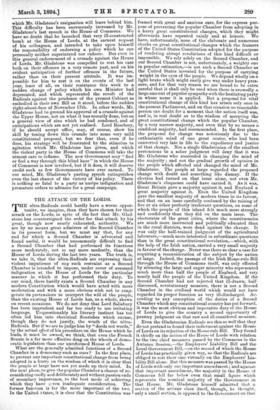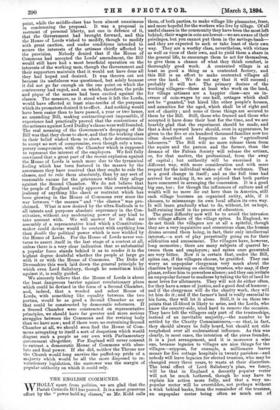THE ATTACK ON THE LORDS. T HE ultra-Radicals could hardly have
a worse oppor- tunity, we imagine, than they have chosen for their attack on the Lords, in spite of the fact that Mr. Glad- stone has countersigned the order for that attack by his great, though now nearly exhausted, authority. We are by no means great admirers of the Second Chamber in its present form, but we must say that, for any end for which a Second Chamber is advocated and found useful, it would be uncommonly difficult to find a Second Chamber that had performed its functions more moderately, not to say more modestly, than the House of Lords during the last two years. The truth is, we take it, that the ultra-Radicals are expressing their violent impatience of any such restraint as a Second Chamber is intended to impose, under cover of assumed indignation at the House of Lords for the particular manner in which it has performed their duty. To our mind, there hardly exists a Second Chamber in any modern Constitution which would have acted with more moderation and with a more obvious wish not to exag- gerate its pretensions to interpret the will of the people, than the existing House of Lords has, as a whole, shown on recent occasions. We do not deny that Lord Salisbury has been imprudent and far too ready to use irritating language. Unquestionably his literary instinct has too often led him into rhetorical flourishes which excuse, though they do not justify, the wrath of the ultra- Radicals. But if we are to judge him by "deeds not words," by the actual effect of his procedure on the House which he leads, it must be owned, we think, that even the French Senate is a far more effective drag on the wheels of demo- cratic legislation than our unreformed House of Lords.
What are the generally admitted functions of a Second Chamber in a democracy such as ours ? In the first place, to prevent any important constitutional change from being adopted in a hurry on the wisdom of which it is clear that the people at large have not yet made up their mind. In the next place, to give the popular Chamber a chance of re- considering coolly and deliberately and without passion ends of secondary importance, to the best mode of achieving which they have given inadequate consideration. The former function is far the more important of the two. In the United t..-tates, it is clear that the Constitution was framed with great and anxious care, for the express pur- pose of preventing the popular Chamber from adopting in a hurry great constitutional changes, which they might afterwards have repented vainly and at leisure. We have, unfortunately, none of the elaborate and numerous checks on great constitutional changes which the framers of the United States Constitution adopted for the purpose of rendering abrupt revolutions of this kind difficult or impossible. We rely solely on the Second Chamber, and our Second Chamber is not, unfortunately, a weighty one in popular estimation,—is not such a Second Chamber as the United States invented for the purpose of carrying weight in the eyes of the people. We depend wholly on a light brake which might easily give way under heavy pres- sure, and for that very reason we are bound to be extra careful that it shall only be used when there is avowedly aa. large amount of popular sympathy with the hesitating party in whose name it is applied. But a proposal for vital constitutional change of this kind has arisen only once in the present Parliament, and on that occasion no reasonable person can doubt for a moment that the nation itself was, and is, in real doubt as to the wisdom of accepting the great constitutional change which the popular Chamber, by a very narrow majority, and even that by no means a confident majority, had recommended. In the first place, the proposal for change was notoriously due to the enthusiastic mind of one great orator, who had been converted very late in life to the expediency and justice of that change. Not a. single Gladstonian of the smallest pretensions to a sober judgment will deny that it was Mr. Gladstone who succeeded in changing the mind of the majority ; and not the gradual growth of opinion in the people which affected and changed the mind of Mr. Gladstone. The people at large regarded the proposed change with doubt and something like dismay. If the election had turned on that issue alone, not even Mr. Gladstone's eloquence could have carried it. As it was„ Great Britain gave a majority against it, and England a great majority against it. Even the United Kingdom gave the smallest majority of modern times in its favour,. and that on an issue carefully confused by the raising of five or six other perfectly irrelevant questions, on some of which the people of this island felt much more strongly and confidently than they did on the main issue. The electorates of the great cities, where the constituencies. are much more instructed and politically educated than in the rural districts, were dead against the change. It was only the half-trained judgment of the agricultural labourers,—much more interested in subordinate questions than in the great constitutional revolution,—which, with the help of the Irish nation, carried a very small majority in favour of the change. Never was there so clear a case for requiring a reconsideration of the subject by the nation at large. Indeed, the passage of the Irish Home-rule Bill through the House of Commons itself, was only effected by silencing the large and eager minority who represented much more than half the people of England, and very nearly half the people of the United Kingdom. If the Second Chamber had not rejected that ill-drawn, half- discussed, revolutionary measure, there is not a Second Chamber in the civilised world which would not ha.ve regarded its proper function as very ill-discharged. Ac- cording to any conception of the duties of a. Second Chamber which any constitutional country has put forward,. it was the most obvious and imperative duty of the House of Lords to give the country a second opportunity of passing judgment on that raw and ill-considered measure..
Even the Gladstonian Radicals see this so well that they do not pretend to found their indictment against the House of Lords on its rejection of the Home-rule Bill. They found it chiefly on the action of the House of Lords with relation, to the two chief measures passed by the Commons in the Autumn Session,—the Employers' Liability Bill and the Local Government Bill,—on the second of which the House of Lords has practically given way, so that the Radicals are, obliged to rest their case virtually on the Employers' Lia- bility Bill alone. But this measure was passed by the House of Lords with only one important amendment ; and against that important amendment, the majority in the House of Commons fell far below even that small figure which represents the nominal majority of the Government in that House. Mr. Gladstone himself admitted that a. section of the artisan class itself, though, he thought,. only a small section, is opposed to the Government on that point, while the middle-class has been almost unanimous in condemning the proposal. It was a proposal in restraint of personal liberty, not one in defence of it, that the Government had brought forward, and this the House of Lords wished to modify, though to modify with great caution, and under conditions intended to secure the interests of the artisans chiefly affected by the provision. Nobody denied that if the House of Commons had accepted. the Lords' amendment, the Bill would still have had a most beneficial operation on the interests of the working men, though the Government and their supporters maintain that it would not have done all they had hoped and desired. It was thrown out not because its usefulness was questioned, but solely because it did not go far enough on the one point on which the controversy had raged, and on which, therefore, the pride and pique of the masses had been excited against the classes. The measure, as it stood when it left the Lords, would have effected at least nine-tenths of the purposes which its promoters desired it to effect. And nothing would have been easier than to have passed, a year or two hence, an amending Bill, making contracting-out impossible, if experience had practically proved that the contentions of the artisans against Lord Dudley's clause were well founded. The real meaning of the Government's dropping of the Bill VMS that they chose to show, and that the working class in their belief wished them to show, their determination to accept no sort of compromise, even though only a tem- porary compromise, with the Chamber which is supposed to represent the interest of the employers. We feel fully convinced that a great part of the recent explosion against the House of Lords is much more due to the tyrannical feeling which has been fostered in the masses by the assurances they have received that they ought to rule the classes, and to rule them absolutely, than by any sort of reasonable excuse for the grievances which they allege against the Second Chamber. We do not believe that the people of England really approve this overwhelming jealousy of anything like check or restraint which has been growing in the House of Commons ever since the war between "the masses" and "the classes" was pro- claimed. What is now desired by the ultra-Radicals is to all intents and purposes absolute supremacy in the Con- stitution, without any moderating power of any kind to take account with. We will answer for it that no assembly of a representative kind which a Constitution- maker could devise would be content with anything less than double the political power which is now wielded by the House of Lords. For the House of Lords never ven- tures to assert itself in the last stage of a contest at all, unless there is a very clear indication that so substantial a popular force stands behind it as to render it in the highest degree doubtful whether the people at large go with it or with the House of Commons. The Duke of Devonshire this week laid down the general principle by which even Lord Salisbury, though he sometimes kicks against it, is really guided.
We sincerely believe that the House of Lords is about the least dangerous barrier against revolutionary plans which could be devised in the form of a Second Chamber, and, indeed, that a weeded and select House of Lords, with something like equality between the two parties, would be as good a Second Chamber as any that could be constructed by democratic reformers. If a Second Chamber were constructed on representative principles, we should have far greater and more serious struggles between the Commons and the revising body than we have now; and if there were no restraining Second Chamber at all, we should soon find the House of Com- mons arrogating to itself a sort of despotism which would disgust such a, people as our own with Parliamentary government altogether. For England will never consent to entrust a democratic House of Commons with abso- lute and final power. If she did, neither the Throne nor the Church would long survive the puffed-up pride of a majority which would be all the more disposed to re- volutionary legislation, the narrower was the margin of popular authority on which it could rely.







































 Previous page
Previous page